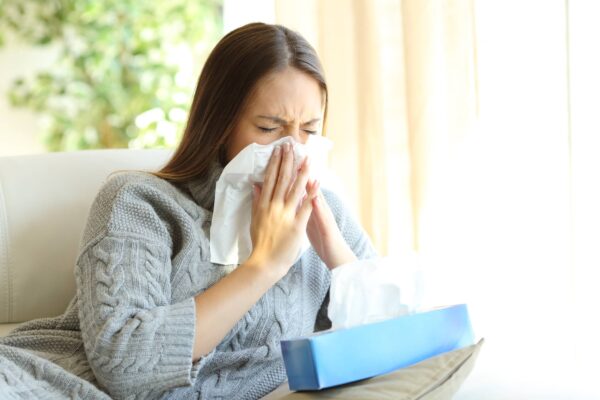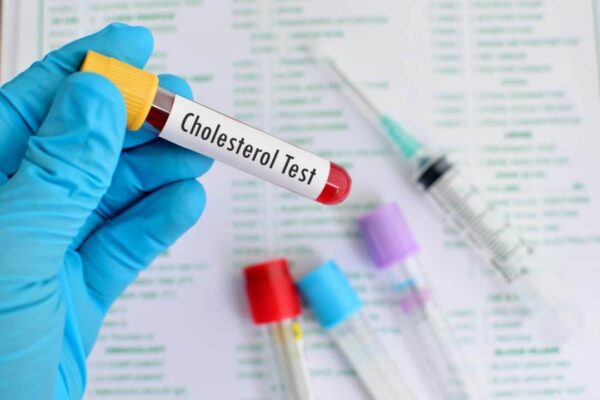If you’ve watched the news at all this winter, you know that the 2017-2018 influenza virus is one of the worst in history and the most deadly since the 2009 swine flu outbreak. That doesn’t mean you should panic, but it does mean it’s essential that you know how to identify flu symptoms if they present themselves so you can be prepared to care for yourself and your family.
One of the hardest parts of identifying the flu is differentiating it from the common cold. While the term “common cold” sounds innocuous, it can feel just as draining. The best way to tell the difference is with the head symptoms; people with the flu don’t typically have a runny or stuffy nose. The flu is also usually more severe than the common cold.
Symptoms of the Flu
The most common symptoms of influenza are:
- Fever
- Chills
- Headache
- Body aches
- Tightness in the chest
- Cough
- Sore Throat (at the onset)
- Runny Nose (less severe than with a cold)
- Sudden onset of symptoms
How Can I Prevent The Flu?
The best way to prevent getting the flu is with a flu vaccine. Everyone is advised to get a flu vaccine, but some people are more susceptible to the flu than others. If you fall into one of these categories, it’s especially important that you get vaccinated. Children, the elderly, and pregnant women should be first in line for their vaccines. It is not advised that you get the vaccine if you are allergic to eggs or egg products. Babies under 6-months of age are also not eligible for the flu shot.
How Can I Be Sure it’s the Flu?
Unfortunately, in the winter months, there are a lot of illnesses that spread like wildfire, especially in high-risk areas like schools, hospitals, and workplaces. If you’re not sure if you have the flu or another flu-like illness, consider these differences. With a flu-like illness, you will likely have stomach and head symptoms, but you will likely not have body aches. Body aches are usually associated with the flu. Also, while flu-like diseases come on slowly over time, the flu usually starts suddenly. If you can identify the day (and especially the time) that your symptoms started, then you most likely have the flu.
When Should I Get Tested
Did you know that you can get tested for the flu virus? A quick nose swab will give you the results within 15 minutes. However, you’ll only be able to treat the flu if you catch it within the first 24 hours. After that, you’ll have to wait it out on your own. Therefore, you should get tested for the flu immediately if you cannot afford to get sick, physically or financially. For instance, if you are a single parent of small children and need to be healthy to care for them, if you can’t afford to miss a week or more of work, or if you simply want to guarantee you won’t have to suffer through weeks of illness. If you decide to get tested, be sure to do so immediately after the onset of symptoms.
How Long Will I Be Sick?
A lot of different factors contribute to how long you’ll feel sick. Namely, how well you take care of yourself while you’re sick, how many fluids you drink on a daily basis, how much sleep you get, and how well your body responds to the illness. However, on average you can expect to feel sick between 5-10 days. The first 3-5 days will be the most intense.
What if my Spouse is Sick?
If your spouse, partner, or a member of your immediate family is sick, it can feel like it’s just a matter of time until you contract the disease. The best way to prevent the flu when those close to you have it is with a flu shot. Unfortunately, the flu vaccine isn’t always 100% effective, so you’ll still want to take precautions. If you are a high-risk person (those with asthma, those who are pregnant, the elderly) then we recommend doing preventative treatment as if you had the flu. This may mean taking Tamiflu from your doctor. Otherwise, your doctor will likely recommend regular infection control. Be sure to wash your hands regularly, cover your mouth when you cough (and ask your sick partner to do the same), and disinfect shared surfaces on a regular basis.
If it’s possible, avoid being face to face with the sick person for the first few days, since that’s when they’re the most contagious. If you’re caring for a child, make sure they put their head on your shoulder to prevent them from coughing in your face.
How Can I Treat the Flu?
Unfortunately, there is no cure for the flu. If you catch the flu immediately (within 24 hours), then an antiviral like Tamiflu may provide relief and lessened symptoms. You can also treat the symptoms of the flu with over the counter drugs like acetaminophen and ibuprofen. These will help with fever and body aches. Over the counter cold medicine may also help with head symptoms like a cough, runny nose, and headache.
When Should I Be Concerned?
Most of the time, the flu will pass on its own. However, you should watch for certain symptoms that could mean your flu has become dangerous and even life-threatening. If you experience these symptoms, get to the hospital immediately:
- Pain in the chest or abdomen
- Difficulty breathing or shortness of breath
- Sudden dizziness
- Confusion
- Severe or persistent vomiting
If your child has the flu, watch for these additional symptoms:
- Lack of tears when crying
- Trouble breathing
- Refusal to eat
- Fewer wet diapers than usual
- Fever with a rash
- Bluish skin
To learn more about this year’s influenza virus (including the best ways to stay healthy and how to treat the illness) visit the CDC’s flu website.
If you are a patient of Peninsula Doctor, we can do rapid testing, diagnosis, and treatment. We’re always here to answer your questions and provide the best diagnostic and preventative care possible to our patients.


